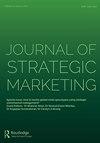姿态的力量:产品失败后的组织声誉与创业导向的作用
IF 3.1
Q2 BUSINESS
引用次数: 0
摘要
摘要本研究的目的是概念性地研究企业战略姿态在多大程度上加剧或抑制声誉损害事件(即产品失败)对后续组织声誉的影响。许多文献都同意这样的观点,即表现出创业行为的公司在很大程度上优于更保守的公司,但目前的研究承认,在这种情况下,创业取向的某个子维度的信号可以减少或增强产品失败的负面后果。目前的研究提出了这样的命题,即主动性、冒险性和创新性高的创业取向信号可能会减少消费者因产品失败而感知到的负面组织声誉,而竞争进取性和自主性高的创业取向信号可能会引发更严重的企业声誉负面感知。本研究的局限性在于其关注于特定的环境,声誉损害事件,并且仅关注于一种战略姿态,即创业导向。另一个限制是目前缺乏实证研究来检验我们的命题。整合归因和信号理论通过认识到这种类型的战略姿态可能被证明对公司有害的设置,为创业导向文献做出了贡献。关键词:组织声誉、创业导向、信号理论、归因理论披露声明作者未发现潜在利益冲突。本文章由计算机程序翻译,如有差异,请以英文原文为准。
The power of posture: organizational reputation following product failures and the role of entrepreneurial orientation
ABSTRACTPurpose The purpose of this research is to conceptually study the extent to which an entrepreneurial strategic posture intensifies or restrains the influence of a reputation-damaging event, namely, a product failure, on the subsequent Organizational Reputation. Much of the literature agrees on the idea that firms exhibiting an entrepreneurial behavior largely outperform more conservative firms, but the current research acknowledges a setting in which signaling a certain subdimension of entrepreneurial orientation can reduce or enhance the negative consequences of a product failure.Findings The current research offers propositions arguing that signals of an entrepreneurial orientation high in proactiveness, risk-taking, and innovativeness are likely to reduce the negative consumer-perceived Organizational Reputation resulting from a product failure, while signals high in competitive aggressiveness and autonomy are likely to trigger more severe negative perceptions of firm reputation.Research Limitations This research is limited by its focus on a specific setting, reputation-damaging events, and its focus on merely one strategic posture, entrepreneurial orientation. Another limitation is the lack of current empirical research to test our propositions.Contributions Integrating attribution and signaling theories contributes to the entrepreneurial orientation literature by recognizing a setting in which this type of strategic posture may prove to be detrimental to the firm.KEYWORDS: Organizational reputationentrepreneurial orientationsignaling theoryattribution theory Disclosure statementNo potential conflict of interest was reported by the authors.
求助全文
通过发布文献求助,成功后即可免费获取论文全文。
去求助
来源期刊

Journal of Strategic Marketing
BUSINESS-
CiteScore
9.20
自引率
7.30%
发文量
43
期刊介绍:
Journal of Strategic Marketing publishes papers on key aspects of the interface between marketing and strategic management. It is a vehicle for discussing long-range activities where marketing has a role to play in managing the long-term objectives and strategies of companies. The objectives of the Journal are as follows: 1.To bridge the disciplines of marketing and strategic management, and to address the development of knowledge concerning the role that marketing has to play in the management of strategy. 2.To provide a vehicle for the advancement of knowledge in the field of strategic marketing and to stimulate research in this area. 3.To consider the role of marketing as an orientation of management at the strategic level of organizations.
 求助内容:
求助内容: 应助结果提醒方式:
应助结果提醒方式:


